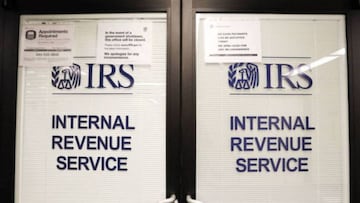Why could the IRS ask for stimulus money back?
Millions of Americans are receiving letters from the IRS informing them that they may need to pay back some of the stimulus money they received. Here’s why…

The federal government sent eligible Americans three rounds of Economic Impact Payments or better know as stimulus checks. The IRS automatically sent out the payments based on the information that the agency had when the direct payments were authorized. Any overpayments in those checks were protected from being reclaimed by the government.
However, some taxpayers didn’t get all that they were eligible for at the time the stimulus checks went out. This was due to the information the IRS used differing from the actual financial or family situation when the payments were sent out. Taxpayers though, could claim any additional funds coming their way through the Recovery Rebate Credit on 2020 tax returns. But a math error meant some taxpayers might have claimed too much and they didn't pay the IRS enough in taxes. Now the tax authority would like that money back.
Also see:
Millions of math error corrections on tax returns
The IRS has the authority to review returns and correct any mathematical and clerical errors they find. For the 2020 filing season department at the agency that handles the corrections was required to go back and check by hand all returns that claimed the Recovery Rebate Credit. The Taxpayer Advocate Service reports that in 2020 there were a little less than 630,000 math error corrections but this number exploded in 2021.
The IRS made roughly 9 million corrections in 2021 and the overwhelming majority were related to people claiming missing stimulus money. Around 7.4 million claiming the Recovery Rebate Credit had a “math error” that needed to be fixed. The agency is still working on a backlog of tax returns with 6.8 million unprocessed individual returns as of 2 October. Included are ones that require special handling including those that need the Recovery Rebate amount corrected. The IRS has managed to greatly reduce the number of returns that need special scrutiny for corrections from close to 10 million in May to 224,000 at the beginning of October.
Some of those corrections are resulting in the tax authority sending letters informing individuals that they have a balance due with the IRS. The letters have been causing confusion among taxpayers because the notices have been missing calculations or explanations according to Dan Herron, a CFP and CFA speaking to CNBC. To add to taxpayers’ frustration the overtaxed agency received 167 million phone calls during this year’s filing season, but only 7 percent got through.
The problem could spill over into next year
The American Rescue Plan authorized a third round of stimulus checks which like the previous two was an advance on the 2021 Recovery Rebate Credit. Again, the IRS sent out the payments automatically based on either 2020 or 2019 tax returns, but this time around the agency made corrections as it processed 2020 tax returns. The IRS sent families a “plus-up payment” if they qualified for more than they received.
Even so, there are still potentially millions who didn’t receive a $1,400 stimulus check, and most likely not the first two either, because the didn’t file a tax return or didn’t use the IRS online tool for Non-Filers. Those taxpayers will still be able to claim the stimulus funds if they file a 2021 tax return next year ( a 2020 tax return to claim the first two stimulus checks), or if they have children sign up, for the Child Tax Credit advance payment scheme before the end of the year.
The fourth of six payments was sent out 15 October, and the program will expire at the end of the year if it isn’t extended. The 2021 Child Tax Credit works a bit like the stimulus checks in that it is advance on half of the credit households can claim in 2021. Some of the same problems may arise next year as people file their taxes to claim the second half of the tax provision.
The IRS is advising taxpayers keep an eye out and hold on to any correspondence the agency sends. It may be needed when you file next year or in the event your tax return was corrected you have 60 days to appeal the IRS’ decision.
- IRS
- Coronavirus stimulus checks
- USA coronavirus stimulus checks
- Child benefits
- Covid-19 economic crisis
- Science
- Social support
- Coronavirus Covid-19
- Economic crisis
- Inland Revenue
- Taxes
- Pandemic
- Coronavirus
- Recession
- Tributes
- Economic climate
- Virology
- Outbreak
- Infectious diseases
- Public finances
- Social policy
- Diseases
- Microbiology
- Medicine
- Economy
- Politics
- Biology
- Health
- Life sciences
- Society






